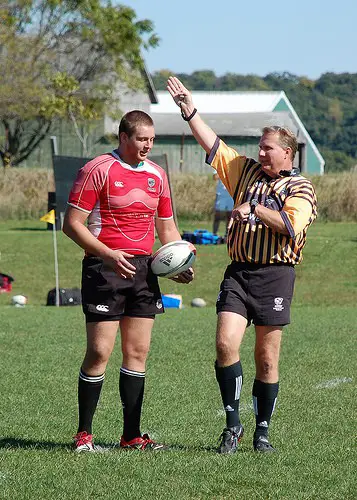To restart the game after an infringement the referee awards a penalty, or a free kick depending on the offence. Penalties are commonly given for: players not releasing the ball on the floor, players not moving away from the tackler, players collapsing mauls, and players being offside.
A full penalty can be either: kicked to touch and the kicking teams throw the ball into the lineout, used to try and get three points by place-kicking the ball through the posts, taken quickly with a quick tap to get the game going again, or converted into a scrum should the captain so request.
A free kick cannot be kicked directly into touch and cannot be place kicked for goal. Instead, a player taps the ball with their foot and the game restarts at that moment.
Conceding penalties and free-kicks through either ill-discipline or through pressure from the opposition is a major decider in the outcome of rugby matches and so it is critical the players understand the laws of the game and that they abide by them.

What Is A Rugby Infringement?
An infringement in rugby is the term used to describe any time in the game when a player breaks the rules. The infringement could be for one of many different reasons, such as: offside, punching, collapsing a maul, and so on.
What Is A Penalty In Rugby?
An infringement leads to the referee awarding either a penalty or free-kick. A penalty is reserved for the more serious offences, such as violent conduct, professional fouls, and deliberate knock-ons.
Free- kicks are reserved for more minor infringements, such as wasting time in a scrum, or having the wrong number of players in a lineout.
A penalty is signalled by the referee by them putting their arm up straight in the air and slightly in the direction of the team who has been awarded the penalty. They usually raise their arm up on the side nearest to the recipient of the penalty and simultaneously blow once on the whistle.
You might also like: Can You Get Up After Being Tackled In Rugby?
How Many Points Is A Penalty In Rugby?
If a team is awarded a penalty and they choose to kick for the goalposts then they will be awarded three points if the kicker kicks the ball over the crossbar and between the posts.
Kickers can usually manage to do this from anywhere in the opponent’s half and sometimes from just inside their own half. Matches that are played at higher altitudes like in South Africa allow players to kick the ball even further from both the hand or the kicking tee.
For this reason, being disciplined is even more important when playing in South Africa.
Recommended reading: What Are Rules For Hand Offs?
What Are Common Penalties In Rugby?
There are all manner of penalties that could be awarded in rugby union but here are some of the most common:
Players not releasing
When a player is tackled and falls to the floor they are allowed to place the ball back on their side. However, after they have done this they must then release the ball. This allows the opposition team to come in and compete for the ball.
It is crucial that this element of the game is enforced by the referee otherwise the same team will always keep the ball and the sport will turn into rugby league!
Players not moving away
When a defender makes a tackle and falls to the floor they have to immediately move away, usually by rolling, from the tackled player. This then allows a clear competition for the ball by supporting players.
It also prevents the ball from becoming stuck in a ruck and unable to be used. This is what slows games down and makes them unattractive to watch so it is up to referees to closely enforce this.
Players collapsing mauls
When one team has created an effective rolling maul that is moving forwards the opposition may decide that the only way they can stop a try is by pulling the maul down.
Usually, players will do this by lifting up the legs of someone in the maul or by diving to the ground in the way of the maul. Both methods will stop the maul but will be penalized by a penalty.
If a team develops a very efficient rolling maul then it is very difficult to win as the team that brings down the maul will eventually be given yellow cards and will have to play with fewer players.
Collapsing a maul can also lead to the refer awarding a penalty try if they believe a try would otherwise have been scored.
Players being offside
It is essential for the defending team to reduce the space that their opponents have in front of them because space allows players to build up speed and build an attack.
Therefore the defence will race up as fast as possible in order to reduce that space. The defender racing up needs to start from an imaginary line across the pitch which is in line with the back foot of the last scrum, ruck, or maul.
Players must stay behind this line, the offside line until an attacker takes the ball out of the scrum, ruck, or maul, usually, the scrum-half who will pass to supporting players which the defenders will attack.
Suggested reading: Red Cards Explained (Sorry Kyle)
What Does ‘Free-kick’ Mean In Rugby Union?
A free-kick is a less harsh alternative to a penalty. From a free-kick a team cannot kick for goal to score points. They are given a mark and have to tap the ball through the mark and the game continues from there.
Often a free kick will be used to pass directly to big ball carriers who will charge into the opposing team’s defence and try to make as many meters as possible before setting up a ruck or maul.
A common tactic is for the scrum-half to tap the ball quickly to themselves whilst the opposition is organizing their defensive line. This means there are often gaps in the line that a small nippy scrum-half can sometimes get through.
What Is A Foul In Rugby?
Foul play in rugby, according to World Rugby, usually falls into one of the following categories:
Obstruction
Players are not allowed to deliberately block an opponent’s path to the ball, or ball carrier. Common occasions when this occurs are when a defender is retreating to chase a kick back and an attacker is running up behind them in pursuit of the ball.
The defender is then not allowed to run across the path of the attacking player in an attempt to slow them down, or shield the ball, or ball carrier.
Similarly a player may not run a line that deliberately prevents a tackler from reaching the ball carrier.
Unfair play
Players must not attempt to waste time, usually by kicking a ball away or walking too slowly to a lineout. They must also not deliberately infringe or break any rules of the game such as throwing the ball into touch, or doing anything to deliberately break the rules and gain an advantage.
Repeated infringements
Players are not allowed to keep committing the same infringement over and over again. If they do then it can lead to free kicks, penalties and ultimately to yellow and red cards.
This can also be judged on a team basis, so teams are not allowed to continually commit the same offences, typically collapsing a rolling maul, or scrum.
Dangerous play
This area covers a whole variety of potentially dangerous acts, such as, leading with elbows or a forearm, collapsing scrums, late/high/dangerous tackles, tripping, kicking, eye gouging, biting, stamping, and so on. One of the most important, however, is that you are not allowed to retaliate.
Maintaining discipline and not retaliating is a key for success in rugby at all levels and is often the deciding factor between a team winning or losing.
Misconduct
With rugby being such a physical game it is highly important that players listen to and respect the referees decisions. Any behaviour, or reaction against their decisions can be deemed as unsporting and classed as misconduct.
So, arguing with referees, or questioning decisions is likely to be dealt with extremely harshly.
Recommended for you: Rugby Union Overtime, Extra Time And Injury Time Rules
What Is The Advantage Law In Rugby?
The advantage law in rugby is when the referee allows play to continue despite an infringement being committed. This is done in case the team who the offence was committed against are likely to benefit more from the situation continuing than from if they were awarded a penalty.
This is one of the most exciting aspects to the game and adds to the general flow and entertainment.
Overall, whilst there are many laws for players and coaches to get their heads around, you do not need to know every single one of them in order to enjoy playing or watching the game, particularly at the amateur level of the game.
So, why not get out there, get involved and play some rugby!
You might be interested in: Rugby Ball Size, Shape, and Age Group Tables
Image Credits
2015 Rugby World Cup match New Zealand vs Tonga at St. James’ Park, Newcastle upon Tyne. quintinsmith_ip, CC BY 2.0, via Wikimedia Commons
Referee giving a penalty 2008, OnTask, CC BY-SA 2.0, via Wikimedia Commons


